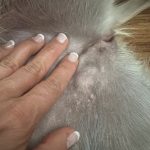In all seriousness, get her bloodwork done. A cat that crazy about food might have a thyroid or other medical issue.
You’ll probably have to separate to feed for a long while yet. If she starts to calm down about it, maybe you’d be able to try feeding in like…a dog crate, perhaps. In the same room, so she can smell their food. It’s a good test while allowing them the ability to eat their own food peacefully.
You can also try bowls which only open for the right collar. Amazon sells them, but they are NOT cheap: https://www.amazon.com/Sure-Petcare-SureFlap-Selective-Automatic-Stress-Free/dp/B00O0UIPTY/ref=sr_1_17?crid=O9337BSZVCPE&keywords=cat%2Bautomatic%2Bopen%2Band%2Bclose%2Bbowls&qid=1695900727&sprefix=automatic%2Bopen%2Bcat%2B%2Caps%2C57&sr=8-17&ufe=app_do%3Aamzn1.fos.f5122f16-c3e8-4386-bf32-63e904010ad0&th=1











Hello
I’m so sorry to hear about your dog. For Ivdd suspected cases I tell people to cage rest, give pain meds , and give them 3 weeks before giving up. Just my advise from being in practice. Most get better. They need time.
Thank you so much for your response. I wish I would have seen this prior to everyone including the vet telling me she needs to be euthanized. My heart and my gut was telling me not to give up but everyone else told me this is the most humane option. Yesterday afternoon we buried her on my Mom’s farm and today has been so very difficult. I feel like I failed her in so many ways.
Again thank you for your response.